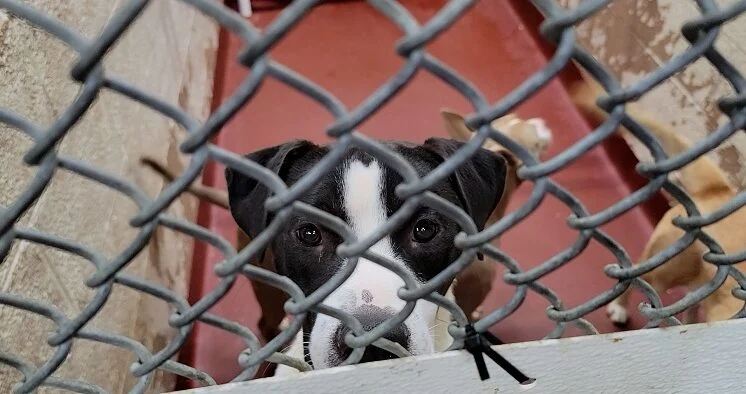The DeKalb County Animal Services Advisory Committee received a bleak report about the status of the county’s animal shelter at their meeting Sept. 21, but the information was nothing new.
Animal intakes have increased year over year since 2020, while adoptions have dropped off.
The shelter, which is run by the LifeLine Animal Project, currently has 1,963 animals in its custody, the majority of which are dogs. There are 1,183 animals in foster homes, including 675 dogs.
The remaining 677 are in a facility designed for 250 dogs. LifeLine founder and CEO Rebecca Guinn said that with expansions, the shelter can be stretched to hold 500 dogs, “but not efficiently.”
“The problem is whatever we estimate, there’s more need,” said Guinn.
Meanwhile, the shelter needs 10 more animal care specialists than it has and has been hiring temps to clean the shelter so that staff can focus on handling animals. LifeLine recently hired a veterinarian and is looking to hire another amid a national vet shortage.
Guinn said that the problem was not only an increase in animals coming into the shelter but an inability of animals to leave.
One aspect of the problem is economic. The crisis in affordable housing has also meant an increase in animals seized because of evictions.
“Families that were struggling before the pandemic are even more marginalized,” Guinn said.
Even when pet owners can find a place they can afford to live, they often find that pets are not allowed.
“In the last couple of weeks, I have encountered people at the shelter who were surrendering their dogs because they could not find a place to live where they could have their dogs,” Guinn said.
Some of the dogs brought in as strays may actually be owner surrenders, Guinn added.
“Over last year, we’ve had a 30% increase in dogs coming in,” Guinn said.
LifeLine is also having to hold more animals, sometimes for long periods of time. Animals seized in neglect and cruelty cases are held as evidence, but courts are still backed up due to the pandemic and jails are overcrowded. Until a case is tried or otherwise disposed of, the shelter must retain custody of any animal involved.
Guinn said that another factor contributing to the problem is that fewer people are seeking pets from the shelter. Instead, they are buying dogs online, frequently from disreputable sources.
“People are buying French bulldogs off the internet,” Guinn said.
During public comment, some community members complained that people fostering pets found it difficult to communicate with shelter staff or get vet care for foster animals.
When asked by Christina Ward if she felt that conditions in the shelter were humane, Guinn bluntly said no.
Ward also asked if Guinn felt animals were getting the medical care that they needed.
“As far as sheltering care, we exceed that standard. As far as the general population, no, they don’t get the care they need. It’s not possible with 600 to 700 animals in the shelter,” Guinn responded.
Despite LifeLine’s goals and record of preserving the lives of animals in their care, Guinn said that the overcrowded conditions contribute to the spread of disease and create hard choices.
“Animals are sick in the shelter due to overpopulation. We are pulling out all of the stops, including euthanasia, to get the population down,” Guinn said.
Euthanasia rates in the shelter have doubled over the last three years, from a low of 3.5% in 2020 to 7.2% so far in 2023.
“I know as the leader of Lifeline that the situation at the shelter is really bad. The number of animals is overwhelming. We are exceeding both financial and human resources. The staff is struggling,” Guinn said.
Guinn added that cities and counties with similar animal services programming, such as Miami-Dade and Pima County (Tucson) are spending $12.50 and $15 per resident on those programs, while DeKalb is spending $9.50.
Public Safety Director Joseph Lumpkin said that it is not possible to simply stop taking animals into custody, because an increase in strays leads to an increase in biting incidents and quickly becomes a public safety issue. However, the county has plans to increase existing capacity combined with efforts to keep pets with owners or find fosters for them.
Lumpkin said there is a midyear budget proposal in front of the DeKalb County Commission that includes upgrades to the shelter’s camera system, additional cages, and $100,000 to expand the capacity of the existing shelter, along with a proposed $860,000 to create shelter overflow. Another $200,000 will go to encourage fostering and pet ownership, and there will also be assistance to encourage people to keep their pets if they are able to do so. Funding for a mobile vet clinic has already been approved.
Guinn said that needed additional staff will not be compensated through LifeLine’s contract with the county, and must be supported through donations.
This story was provided by WABE content partner Decaturish.









